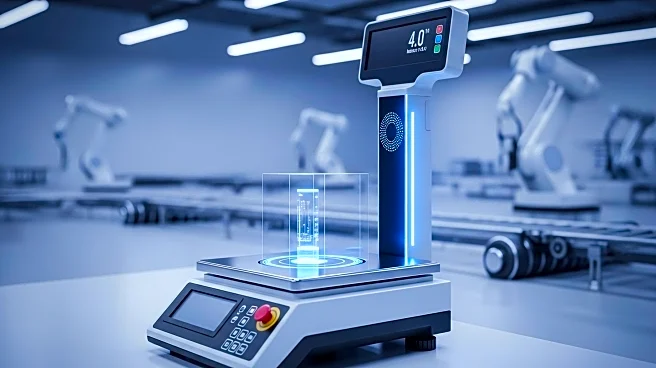What is the story about?
What's Happening?
Nuweigh, a longstanding name in Australia's weighing industry, is adapting its technology to meet the demands of Industry 4.0. The company has been providing solutions ranging from compact laboratory scales to large-scale industrial weighbridges since 1976. In the current era, Nuweigh is focusing on integrating advanced sensors and data processing capabilities into its weighing systems. These modern systems not only measure weight but also connect to digital networks, offering automated ticketing, reporting, and remote monitoring through its ClearWeigh software. This transition reflects a broader industrial shift towards smart manufacturing, where precision and connectivity redefine value. Nuweigh's systems now serve as data hubs, capturing real-time measurements and integrating with logistics systems, thus becoming integral nodes in the digital economy.
Why It's Important?
The evolution of weighing systems is significant as it aligns with the broader industrial transformation towards smart, data-driven industries. By integrating advanced sensors and connectivity, Nuweigh's systems enhance efficiency, compliance, and sustainability in sectors like manufacturing and logistics. This shift is crucial for industries that require high precision, such as pharmaceuticals and food processing, where even minor inaccuracies can have significant consequences. The ability of these systems to self-diagnose and connect directly to networks reduces downtime and allows for predictive maintenance, thereby optimizing operations and reducing costs. As weighing systems become central to digital transformation, they provide actionable insights and business intelligence, making them indispensable in modern industrial processes.
What's Next?
Looking ahead, weighing technology is expected to continue evolving alongside Industry 4.0. Future developments may include the integration of artificial intelligence to refine accuracy, the use of quantum and nanotechnology sensors for near-zero drift, and the creation of digital twins for virtual modeling of physical systems. Enhanced cybersecurity measures will be crucial as weighing data influences billing, logistics, and compliance. Additionally, smarter weighing systems will contribute to greater sustainability by reducing material waste, optimizing loads, and lowering emissions across supply chains. These advancements suggest that the weighing industry will play a central role in digital transformation, embodying the principles of Industry 4.0.
Beyond the Headlines
The integration of advanced sensors and data processing in weighing systems raises ethical and legal considerations, particularly regarding data privacy and security. As these systems become more interconnected, ensuring the integrity and protection of data will be paramount. The shift towards smart manufacturing also highlights the need for skilled labor capable of managing and interpreting complex data systems. This transformation may lead to long-term shifts in workforce requirements, emphasizing the importance of education and training in digital technologies. Furthermore, the increased precision and connectivity of weighing systems could drive innovation in other sectors, fostering a culture of continuous improvement and technological advancement.
















